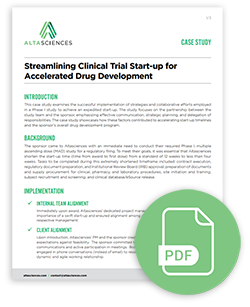Drug-Drug Interaction Studies
Early-Phase Clinical Expertise in Drug-Drug Interaction Studies
Data from drug-drug interaction (DDI) studies is essential for informing other clinical protocols and meeting regulatory requirements, which can directly impact the timing of your drug development program.
We specialize in conducting comprehensive DDI clinical trials, providing you with the data you need to move forward confidently. With our extensive experience and state-of-the-art facilities, we ensure rapid start-up times and seamless project execution.
Whether you need stand-alone studies or DDI trials embedded within larger Phase I studies, we have the expertise to deliver precise and reliable results, tailored to your project’s unique needs.
Discover how Altasciences can optimize your drug-drug interaction studies and accelerate your path to regulatory approval.
Contact us today to discuss your DDI study requirements.
Need to Conduct a DDI Trial?
Here's Why You Should Conduct It With Us
We conduct early-phase DDI trials with deep expertise, having designed, analyzed, and reported on hundreds of studies. From the simplest to the most complex study designs, our clinical teams have experience with all common substrates for drug-drug interaction studies.
Depending on your project needs, we run stand-alone DDI studies or embed them within larger Phase I trials. In the past five years, we have completed more than 50 studies, including:
- Single interaction
- Multiple interactions across cohorts
- Multiple interactions within a cohort (cocktail studies)
- Interactions at specific dose levels or participant subsets within larger trials
We routinely perform CYP genotyping to identify appropriate participants or stratify groupings for pharmacokinetic DDI studies. Our drug metabolism and interaction testing ensure precise data collection and analysis.
We offer both short- and long-term, inpatient stays for intensive monitoring as well as outpatient studies for extended evaluations.
Study Start-Up—Don’t Let a DDI Study
Delay the Start of Your Phase II/III Trial
Need to address inclusion/exclusion criteria and concomitant medications for your Phase II/III protocol? Are you facing an unexpected FDA request for a post-marketing amendment? We understand the urgency. The need for DDI data often arises at the initiation of later phase studies, and we are well prepared to respond swiftly with DDI regulatory consulting and expert drug-drug interaction clinical trial services.
We can mobilize quickly—starting trials in as little as four weeks. Our approach includes effective communication, strategic planning, and a dual project management structure, ensuring seamless alignment between our internal teams and the sponsor. This facilitates prompt decision-making and rapid issue resolution for seamless, comprehensive DDI clinical trials.
By streamlining processes—such as contract execution, regulatory document preparation, and participant recruitment—Altasciences demonstrates a commitment to efficiency and timely DDI clinical trial results. Strong project management, a dedicated team, and close sponsor collaboration lead to significant reductions in start-up timelines.
With three clinical pharmacology units and co-located bioanalytical laboratories in the U.S. and Canada, we provide dual regulatory pathways—Investigational New Drug (IND) and Clinical Trial Application (CTA) for Canada. Our focus on efficiency ensures rapid start-up and streamlined timelines for your DDI clinical trial.
Recruitment for DDI Clinical Trials
We excel in recruiting participants for DDI studies. With a large pool of over 400,000 healthy normal volunteers, special populations, and patients, as well as access to over 2,600 genotyped volunteers, we can rapidly recruit and enroll participants. Our recruitment strategies and database ensure we meet enrollment targets swiftly, so your study progresses without delays.
Key Advantages of Our Recruitment Strategy
|
1 |
Our dedicated recruitment team and streamlined processes ensure a quick turnaround from protocol approval to participant enrollment, keeping your DDI studies on track. |
|
2 |
Our well-established databases allow us to pre-identify study participants and perform targeted outreach. With access to many demographics, ethnicities, special populations, and patients, we can predict recruitment timelines efficiently. |
|
3 |
We have a sizeable database of poor and extensive metabolizers for different CYP enzymes, enabling targeted recruitment for DDI studies, including specialized genotyping campaigns. As part of our screening process, we routinely genotype participants for key enzymes, including CYP3A4, CYP2D6, CYP2C9, CYP2C19, and HLA-B 5701. |
This precise approach to recruitment, combined with our innovative strategies and large participant pool, ensures that your DDI trial reaches its enrollment targets quickly and retains participants, maximizing study success and data integrity.
Turnkey Solution for DDI Trials
We offer a turnkey solution for conducting DDI studies, handling every aspect of your trial from start to finish. Our comprehensive DDI clinical trial services include:

Protocol review/writing:
Whether starting from scratch or refining an existing protocol, our team of clinical experts will ensure we streamline the process to support informed decision-making and meet your critical study milestones. With our deep understanding of DDI studies and early-phase clinical trials, we ensure comprehensive, regulatory-compliant study design. We tailor protocols to meet the specific requirements of custom drug-interaction studies, focusing on efficient timelines and precise data collection.

Clinical conduct:
Our three state-of-the-art clinics across North America are fully equipped to run your DDI studies, with expert teams managing dosing, sampling, and intensive monitoring.

CRA/Clinical monitoring:
Real-time tracking of pharmacokinetic (PK) and pharmacodynamic (PD) data, safety assessments, and adverse event reporting, ensuring compliance with regulatory requirements and maintaining data integrity throughout your DDI trial.

Bioanalytical services:
Our well-equipped, co-located bioanalytical labs offer over 685 validated methods, including a wide range of DDI comparators, ensuring precise and timely PK data. Leveraging these established methods, we provide the reliable data you need to meet regulatory standards, enabling faster decision-making and comprehensive label information.

Data Services and Reporting:
We handle data management, analysis, and comprehensive reporting to deliver high-quality DDI clinical trial results on time.

Regulatory Consulting:
Our regulatory experts can assist with mapping out when you need to conduct your DDI studies.
At Altasciences, we will ensure your DDI study is fully enrolled with the right participants, conduct your study, and deliver your data on time.
Putting Participant Safety First
Our safety procedures are rigorous, and our operations and facilities ensure that participant safety remains the top priority in every trial.
- Feasibility/risk assessment – from receipt of first requirements until study completion
- Investigator assesses participants daily
- 24/7 Advanced Cardiac Life Support (ACLS) provider coverage on-site
- Basic Cardiac Life Support certification for all clinical staff
- Crash carts on-site
- Scenario-based response training
- Telemetry with pulse oximetry
- Strategically placed panic buttons
Related Resources for DDI Clinical Trials
FAQ
How quickly can Altasciences initiate a DDI clinical trial?
- When appropriate, we can accelerate start-up times. We have started a trial in as little as four weeks. Typical study start-up times range from eight to 12 weeks.
What types of interactions can be tested in a DDI study?
DDI studies typically evaluate PK and PD endpoints, and can include but are not limited to:
- Metabolic enzyme inhibition and induction — confirming if a drug can act as a precipitant, i.e., inhibit or induce the activity of enzymes (like CYP enzymes) that metabolize other drugs (the object), potentially affecting plasma concentration.
- Drug transporter interactions — evaluating if a drug inhibits or induces the activity of transporters involved in absorption, distribution, and excretion, which affects the drug's availability at its target site.
- Plasma protein binding displacement — examining if a drug displaces another from binding sites on plasma proteins, which leads to increased free drug concentration and potential toxicity.
- Synergistic or antagonistic effects — studying whether the combined effect of two drugs is greater (synergistic) or less (antagonistic) than their individual effects.
- Target site competition — assessing if two drugs compete for the same receptor or target molecule, potentially modifying each other's pharmacological activity.
Not only can a sponsor’s drug inhibit or induce the activity of enzymes/transporters, but the drug can also be the object of metabolic enzymes and/or transporters. This will affect the efficacy of that drug or its safety profile.
What are some best practices that Altasciences follows in designing drug-drug interaction studies?
- The gold standard for clinical DDI studies is a prospective crossover (one-sequence or randomized) design conducted in healthy normal volunteers. This approach minimizes interindividual variability, as participants serve as their own controls. Variability is further reduced in healthy individuals who have normal kidney and liver function, do not take additional medications, and lack other interfering factors such as smoking. Confinement under a controlled environment during the entire study may also help to reduce variability and risk of dropouts.
- In two-way pharmacokinetic crossover DDI studies, sample sizes around 10 to 20 participants are often sufficient to detect significant interactions, though larger groups (two to three times the size) may be needed to confirm the absence of interactions. Additionally, the washout period between study phases must be long enough to ensure complete clearance of drugs, metabolites, and their effects, even when elimination is delayed by strong inhibitors.
- Parallel designs may be considered as an alternative study design when a crossover is not suitable (e.g., for drugs with a long half-life).
What steps does Altasciences take to support participant safety during DDI clinical trials?
- Feasibility/risk assessment – from receipt of first requirements until study completion
- Daily investigator assessment of participants
- 24/7 Advanced Cardiac Life Support (ACLS) provider coverage on-site
- Basic Cardiac Life Support certification for all clinical staff
- Crash carts on-site
- Scenario-based response training
- Telemetry with pulse oximetry
- Strategically placed panic buttons
Can Altasciences customize study designs for complex DDI clinical trials?
- Yes, our experts in study design and conduct can adapt to the needs of your program with custom drug-interaction study design, taking into account the drugs involved, the DDI study design itself, dosing regimen, cocktail approach, recruitment specifics, and PK/PD parameters, to deliver safe, robust data in a timely way.
Which comparators can be analyzed at Altasciences for a DDI clinical trial?
- We maintain a large selection of common interacting substrates known as strong index substrates, validated for various drug interactions, including Theophylline, caffeine – CYP1A2, Efavirenz, bupropion/hydroxybupropion – CYP2B6, Repaglinide – CYP2C8, S-warfarin – CYP2C9, Omeprazole – CYP2C19, Desipramine and dextromethorphan – CYP2D6, Midazolam – CYP3A4/5,
- We have additional validated assays for strong index inhibitors: Fluvoxamine – CYP1A2, Fluconazole – CYP2C19, Paroxetine – CYP2D6, Clarithromycin and Itraconazole – CYP3, Ramipril
- Strong index inducers: Rifampin – CYP2C19 and 3A; Carbamazepine – CYP2B6 and 3A, Phenytoin – CYP3A
- Transporter substrates: Dabigatran and digoxin – P-gp; Rosuvastatin – BCRP and OATP1B1/1B3, Furosemide – OAT1/3, Metformin – MATE1/2K and OCT2
- Transporter inhibitors: Itraconazole – P-gp, Dolutegravir – MATE1/2K, OCT2
- Transporter inducers: Cyclosporine – P-gp, BCRP, OATP (also an inhibitor of BCRP, OATP1B1/1B3)





